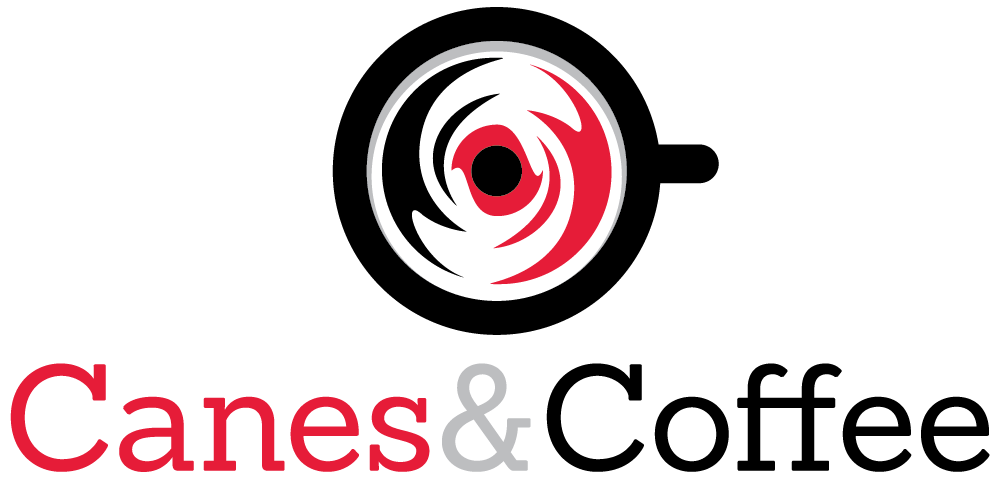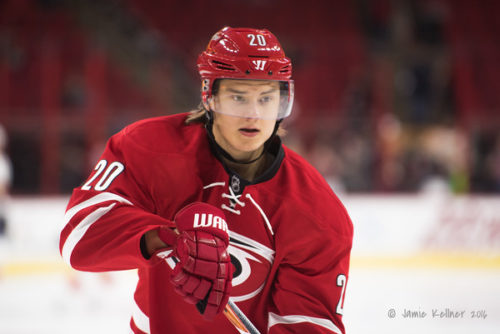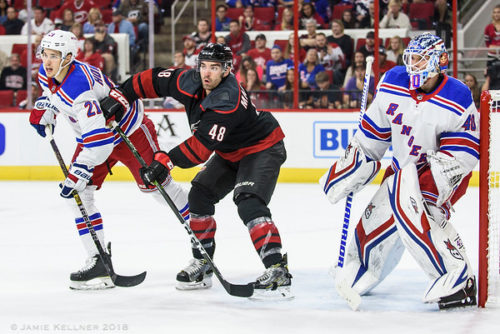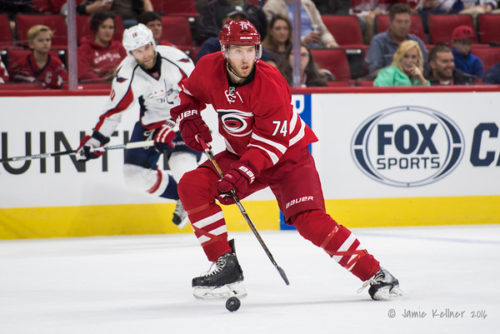After Wednesday night’s Canes game, the team announced that Justin Williams had signed and would be joining the team. My Daily Cup of Joe for Thursday offered two perspectives on the announcement. First was a link to an article that I wrote three weeks ago about the situation. That article had me on the fence but leaning slightly negative on a Justin Williams return. Second was a Twitter thread from a couple days ago that leaned somewhat more positive simply considering him a good trade deadline type addition with not trade cost and leadership to boot.
Today’s Daily Cup of Joe will be part 1 of 2 looking at Williams’ return in a bit more depth with part 1 today focusing on the broader situation, leadership, etc. and part 2 to follow looking very simply at Williams as a player addition and where he fits into the lineup.
2018-19 and prior
An important starting point for considering the entire situation is Justin Williams’ history including the 2018-19 season but also prior. Williams returned to the team for the 2017-18 season when the team was young and potentially rising but also a perennial draft lottery participant that owned the longest run without a playoff appearance. As a veteran with a massive reputation for playoff performance, Williams no doubt had other options and instead chose to sign with the Hurricanes and play a role in the task of turning the organization around.
Paired with being a part of the 2006 Stanley Cup champion team and leaving only because he was traded, Williams is more than just a random free agent who spent a few years with the team and was up for a next contract.
And when one also considers his role in the 2018-19 season, his place in the organization is even greater. After the magnificent three month run into the playoffs and then the magic that happened pushing all the way to the Eastern Conference Finals, it is almost like some fans erased their memories of the struggles that preceded the 2018-19 season. The Canes had the longest playoff drought in the entire NHL and earned it by seemingly having a ‘find a new way to lose’ aura about them. The team seemed to be stuck on repeat with starting slow and playing their way out of the playoffs and then once the pressure was off pushing back. That won accolades for not throwing in the towel but in some ways only being able to muster desperation when it was too late seemed to be an inescapable fatal flaw.
Certainly, others deserve credit too, but I think Williams was instrumental in changing the mentality and attitude of the team. Losing was no longer okay or something to be accepted. When the team was not good enough, Williams pressed to find a way to be better rather than accepting it, and the rest of the young team eventually followed.
I think the context of Williams’ history with the team is an important component for considering the complex situation and series of events.
This past summer
After a long, arduous season that paid just rewards accomplishing exactly what Williams had set out to do, the case for Williams at 37 years old to exit on a high note was a strong one.
But I think more significant than that was the fact that Williams would not return just because he could. After his role in returning the franchise to relevance in 2018-19, he could easily have just demanded a good or better one-year contract and not been bogged down about whether he would be ready to pour his heart and soul into another long 82-game season. And many players would have done exactly that — collect on the 2018-19 season. Instead, Justin Williams did the honest soul searching to determine if he was ready to go at 110 percent again. And though we do not know exactly what Williams’ thought process was, I think Canes fans who have jumped on Williams for being selfish, greedy or whatever else is incredibly disrespectful given what he just did for this team.
No doubt, the timing of Williams decision was not ideal. Something like mid-July would have been better for the team knowing its roster and budget for building out the 2019-20 team. But again, I actually give Justin Williams credit for not just collecting the paycheck and worrying about commitment level later if at all.
The first half of the 2019-20 season
With new, or I guess returning, leadership in place, the 2019-20 Carolina Hurricanes have had a roller coaster ride of a first half. The team started hot and had other bursts of great play including the recent 4-0-1 road trip. But the team has also struggled at times and seems to win more by having enough days where the offense kicks into high gear and overrides any sloppiness or imperfections. But important to note is the fact that after 43 games and before the return of Williams, the 2019-20 Carolina Hurricanes were in playoff position and significantly better off than the same point in the 2018-19 season.
Per my article about three weeks ago, I do not think that there is a dire crisis in leadership and the general trajectory of the team right now. We will never know what would have happened had Williams not returned, but based on being in playoff position after 43 games, it is reasonable to project that the same would be true at the end of 82 games.
So then is there value in Justin Williams’ leadership abilities?
Saying that the 2019-20 Carolina Hurricanes do not necessarily need more leadership is not at all the same as saying that they cannot benefit from it. More leadership in the form of quality veterans is a positive. Teams go out of their way at the trade deadline to add players like Justin Williams who can contribute on the score sheet but equally importantly have experience and success in pressure situations like playoff races and the playoffs themselves.
Exactly what Williams’ role will be in the leadership structure both formally and informally will be interesting to watch develop. But he will definitely have a role, and I expect that will be a significant positive down the stretch and into the playoffs.
What then will Williams’ leadership role be?
Personally, I would find it odd for Brind’Amour to strip Jordan Staal of the ‘C’ and give it to Williams. I could see a scenario whereby Staal voluntarily deferred and gave it up (without pressure to do so) but not one where he was pushed to do so or one where someone else just made that decision. Could Williams be an additional ‘A’ or replace an ‘A’? Maybe. Could he not wear a letter at all but obviously still have a voice in the room? I think so, though I do think the 2017-18 season shows the challenge of trying to lead the right way without going above people’s heads without a letter.
But more significantly, Rod Brind’Amour gets people and knows the team, the locker room and the individuals in it. If anyone is capable of sorting things out in the best way possible, I trust that Brind’Amour is that person.
So rather than having a strong opinion of how best to rework the leadership hierarchy, I mostly just trust that Brind’Amour will be on target.
But there is some complexity to the situation
Over the next few days, all of the formal media will write articles that are sprinkled heavily with quotes from various parties making this transition out to be insignificant. Their job is generally to report things, so what members of the team and organization say are easy pickings for the Justin Williams’ articles. Brind’Amour will say that the transition is a non-issue. The players will welcome Williams back with open arms and enthusiasm. Williams himself will talk about just wanting to do his part to help the team win.
Those things are all true. And by no means am I suggesting that there is ill will lurking under the surface. But the fact of the matter is that the Williams’ return is a significant change to the locker room and the leadership. Jordan Staal’s role just changed even if it is not yet clear exactly how. Likely a player who is 43 games deep into the season will be a healthy scratch soon, so Williams can play. And the locker room dynamics in general are different.
Saying that it is no big deal is the right thing to say in interviews, but that is not the reality of how people work in situations of change like this.
So is there risk?
I actually think there is, but I think that risk is minimal because of a couple key factors. First, this is not at all a case where Williams is a possible problem or negative. He is a good guy, and the locker room knows it. He wants what is best for the team and nothing else. Second and very importantly, one of Justin Williams’ greatest strengths as a leader is his ability to understand and work with people. So the potential risk of him accidentally being a bull in a China shop trying to do too much and inadvertently trampling the current leadership is incredibly small. Combined with Brind’Amour also being people aware and focused on what is best for the team, I trust that though things will change that they will figure it out in a way that does not upset the apple cart that in general is moving along pretty well so far in 2019-20.
Netting it out
It will be interesting to see what exactly Williams’ role will be leadership-wise both formally and informally, but at a very basic level adding another veteran with strong character and leadership qualities and importantly a team-frist attitude is a positive and exactly what teams want at this time of year.
That said, I think the transition that will be mostly denied or at least understated in interviews that are full of ‘but of course’ right answers is more significant than this week’s Justin Williams’ articles will suggest.
The thing I bet on is that the group will figure it out and be a better team for it based on the fact that both Rod Brind’Amour and Justin Williams are team-first people and possess a high people IQ.
In addition (and the subject of part 2 to follow probably tomorrow), I think Williams is a significant addition very simply as a productive player if one puts the leadership, history and everything else to the side and just evaluates him like a trade deadline acquisition.
What say you Canes fans?
1) What do you make of the timeline that say Williams wait deep into summer to make a no-go decision only to then return at the midway point? Does that bother you? Is it relevant to the path forward? Or is it a non-issue?
2) To what degree do you buy the interview party line that Williams’ re-integration is simple/easy versus my assertion that simply because of how people are with change that there is a bit more complexity to this?
3) What other thoughts do you have on Justin Williams’ return?
Go Canes!




1) Matt, as you mention it is “incredibly disrespectful” to see Williams, who has meant so much to the organization, as in the wrong. But many did. What bothered me is that Williams gave a few indications that he was somewhat willing to play the entire season. At one point he said he asked his children and they responded that they supported him playing. From all appearances (I don’t know JW at all) he has both a lot of pride and a lot of professional integrity. He has always been loyal to the organization. In that way he is much like Chuck K. To me the scenario that makes the most sense given William’s professionalism and pride is that he thought he was worth a one-year contract with a similar salary.
2) While it will be slightly harder, it isn’t that different than getting a player back from injury. Think Staal last season.
3) He will need to better at swiping pucks off the goal line if he is going to resolve the Canes biggest concern.
Fans are nuts and lose all perspective sometimes. Everything I’ve read says that Justin Williams is a sincere and straightforward person. But either way, he’s at the end of a long and storied career, he’s widely respected, and he’s earned the right to make decisions like stepping away. I expect he’s going to be a part of Canes organization when he retires, maybe even assistant coach in a few years.
It’s an odd situation for sure, but it does seem like Staal and Williams are the perfect guys to handle it appropriately.
At some point there’s going to be an injury to a forward and then having an extra NHL forward is going to really pay off. Until then, it’s definitely going to be a tough situation for whichever player is a healthy scratch.
1). All professional athletes are necessarily good at putting the past behind them. As CT pointed out, with respect to leadership, re-integration is very similar to Staahl’s return last year except with the roles reversed. Last year Willy demonstrated how a captain should handle it.
2) re-integration will be straightforward. Deadline trades always carry some risk, but not this one. Justin Williams gave up the captaincy with knowledge, foresight, and contemplation. He will come crack as a high character guy in 100% support of the new captain.
3) I couldn’t be more thrilled. Yes he probably lost a step. Yes it will take a few games. For age and skill level, I think of the Mark Recchi acquisition in the cup year.
Willy is ready.
Svech is ready.
The canes are ready.
#takewarning
#goingthisweekend
It’s really hard to imagine that the leadership issue hasn’t already been fully discussed by all the relevant parties – TD, GMDW, RBA, Staal, JW, Slavin, Martinook, etc. – and it’s also hard to imagine that anyone is going to have any issue or trouble reintegrating JW back on to the team given what his role was last year and the success that led to. To me, this is a complete non-issue; I’m sure there is already a thoughtful plan.
I’m much more curious about how he’s going to be reintegrated on the ice. That seems to me to be the much bigger question mark. Having said that, I said the same thing a year ago after the team started their up-surge in play after Staal’s concussion and I wondered how he would slot back in once healthy. That concern was, in retrospect, quite silly. The same is probably true now with JW.
I agree that the angst over the leadership thing is totally overblown. Do you really think that Williams has the kind of ego where he needs to have a letter on his chest? Do you think the guys in that room see him any differently without the letter? To me it’s a big positive. Williams is a vocal leader with tons of credibility. If anything he will take some of the pressure off Staal and Slavin who are more lead by example guys from what I see. Martinook is still the cheerleader. Williams will say the thing that need to be said. Perfect.
The reason I am not overly concerned about Williams the player is that he hasn’t depended upon being bigger, stronger, and faster to have impact. He hasn’t been any of those for a while. His strengths are hockey IQ and good hands. Hopefully his hands won’t take long too get up to game speed. I think Williams could be playing in the top 6 much faster than most expect.
1) non-issue. Williams is totally credible. He is 100% or nothing. He waited until he was sure he was mentally sure.
2) Williams went out of his way to say it’s all about team. He will not be stepping on any of the present leadership, he will only augment. I think he could care less about a letter, and nobody else will care either. This is not an ego trip. He could have gone anywhere, he chose here for league minimum. This is about wanting to be part and making a difference. The attitude could not be any better. It’s all the right reasons.
3) my guess is guys like NN, McGinn and Marty will be rotated, and possibly Williams as well (once he gets up to speed) to keep players rested, until if/when an injury occurs. Rotated depth. Everybody would like to play every game but I bet they buy into sharing for the team. I do not see big problems. I see team in this group, not individualism. They all know what his addition could bring in terms of winning.
Have to agree with CT, hopefully he will be good at swiping things out of the crease. The biggest thing this team could used is reasonable goaltending. It just seems to get worse every game.